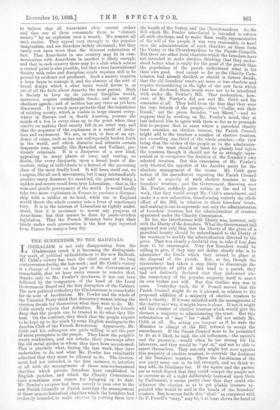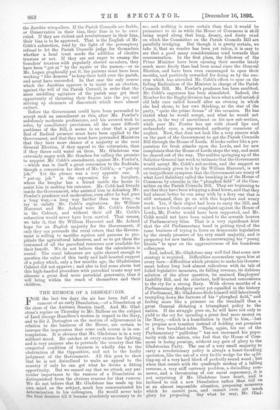THE SURRENDER TO THE RADICALS.
IBERALISM is not only disappearing from the 4 Gladstonian creed, it is becoming the distinguish- ing mark. of political unfaithfulness to the new Radicals. Mr. Cobb's victory has been the chief cause of the long controversies during the last week ; and Mr. Cobb's victory is a change of front on the part of the Government so remarkable, that we have every reason to wonder that, thanks only to Mr. Fowler's meekness, it has not been followed by the resignation of the head of the Local Government Board and the first disruption of the Cabinet. The new political orthodoxy for Gladstonians is remarkable for its note of Jacobinism. Mr. Fowler and the whole of the Unionist Party think that democracy means letting the electors decide for themselves what they wish to do. Mr. Cobb sternly rejects that definition. He and his friends deny that the people can be trusted to do what they like best. On the contrary, they think that the people require to be kept up to the mark by some English analogue to the Jacobin Club of the French Revolution. Apparently, Mr. Cobb and his colleagues are quite willing to act the part of stern prompters to the people. They know the people's secret weaknesses, and can rebuke their yearnings after the old social guides to whom they have been accustomed. This is precisely what, during the last week, they have undertaken to do, and what Mr. Fowler has reluctantly admitted that they must be allowed to do. The Govern- ment had not intended, in the first instance, to interfere at all with the management of those non-ecclesiastical charities which private founders have established in English parishes, and which the Charity Commission have sometimes seen reason for bringing up to date. Mr. Fowler's purpose had been merely to pass over to the new Parish Councils or Parish meetings the management of those non-ecclesiastical charities which the founders had evidently intended to make elective by putting them into the hands of the Vestry and the Churchwardens. As the Bill which Mr. Fowler introduced is intended to reform all such elections, and to make them really representative of the will of the people, it was very reasonable to liand over the administration of such charities as these from the Vestry or the Churchwardens to the Parish Councils. But there are other local charities which the founders have not intended to make elective, thinking that they under- stood better what is really for the good of the parish than the population of the parish understand what is for their own good. And except so far as the Charity Com- mission had already decided, or should in future decide, that the old founders' trusts are more or less obsolete and require reconsidering in the light of the new facts which time has disclosed, these trusts were not to be interfered. with under Mr. Fowler's Bill, That moderation, how- ever, of Mr. Fowler's did not suit Mr. Cobb and. his comrades at all. They held from the first that they were the true friends of the people,—that " Codlin was their friend," not the pious founder, "not Short,"—and we suppose that by working on Mr. Fowler's mind, they at last induced him to agree with them so far as to persuade him to propose that in cases where a parochial charity trust contains no elective trustee, the Parish Council might add to the trustees a number of elective trustees, not exceeding one-third of the whole number,—the view being that the wishes of the people as to the administra- tion of the trust should at least be plainly laid before the trustees, though it should not be so strongly repre- sented as to overpower the decision of the founder's own selected. trustees. But this concession of Mr. Fowler's only whetted the appetite of the Jacobin party for the absolute management of the trusts. Mr. Cobb gave notice of his amendment requiring the Parish Council to add a majority of such elective trustees to the founders' trustees ; and the Government, throwing over Mr. Fowler, suddenly gave notice, at the end of last week, that they would. accept Mr. Cobb's amendment, and. make it a new subsection, transforming entirely the whole effect of the Bill, in relation to these founders' trusts, and making it one to supersede not only the administration of founders' trustees, but the administration of trustees appointed under the Charity Commission. So far, the interference with liberty was, however, only with the liberty of the founders. What the Government had approved was only this, that the liberty of the giver of a parochial bounty should be subordinated to the liberty of the receivers to modify the administration directed by the giver. That wis clearly a doubtful step to take if foui.ders were to be encouraged. Very few founders would be willing to give, if they may not define clearly who is to administer the funds which they intend to place at the disposal of the parish. But, so far, though the Government had taken a step likely to discourage the appropriation of gifts of this kind to a parish, they had not distinctly declared that they distrusted also the competency of the popular majority itself to asseit its own wishes and. will. But this further step was to come. Yesterday week, Sir F. Powell moved that the Parish Council might do as it pleased, in relation to the proposed addition of a majority of elective trustees to such a charity. If it were satisfied with the management of the charity as it was, it might leave it alone. If not, it might add the number of elective trustees which would give the electors a majority in administering the trust. But this substitution of " may " for " shall " did not satisfy Mr. Cobb at an He, acting pro tempore as if he were the Minister in charge of the Bill, refused to accept the amendment. If the Parish Council were to be permitted to do as it liked, he said, the old influences,—the squire's and the parson's,--would often be too strong for the labourers, and they would be "got at," and not be able to assert themselves. They not only might but must appoint this majority of elective trustees, to override the decisions of the founders' trustees. There the Jacobinism of the new party came out in its full strength, and we think we may add, its blindness too. If the squire and the parson are so much feared that they could compel the people not to exercise at all a right deliberately bestowed upon them by Parliament, it seems pretty clear that they could also influence the election so •as to get pliable trustees ap- pointed who would be well in the hands of the founders' trustees. But however futile this " shall " as compared with Sir F. Powell's "may," may be, it at least shows the hand of the Jacobin wirepullers. If the Parish Councils are feeble, or Conservative in their bias, their bias is to be over- ruled. If they are violent and revolutionary in their bias, their bias is to be approved. That is the English of Mr. Cobb's subsection, read by the light of the peremptory refusal to let the Parish Councils judge for themselves whether a local trust needs the addition of elective trustees or not. If they are not eager to swamp the founders' trustees with popularly elected. members, they have been "got at" by the squire or the parson,—or as Mr. Logan graphically put it, the parsons must have been working "like demons "to keep their hold over the parish, and must have succeeded. In that case the only course which the Jacobins approve is to insist on an election, against the will of the Parish Council, in order that the more meddling agitators of the parish may get their opportunity of thrusting their fingers into the pie, and stirring up elements of discontent which were almost extinct.
Before the Government could have been persuaded to accept such an amendment as this, after Mr. Fowler's sedulously moderate professions, and his avowed wish to solve, by conciliatory provisions, all the more difficult problems of the Bill, it seems to us clear that a great deal of Radical pressure must have been applied to the Government, and that they must have persuaded Ministers that they have more chance of a majority at the next General Election, if they appeal to the extremists, than if they throw cold water on them. Mr. Gladstone was extremely angry with Mr. Goschen for calling the promiss to support Mr. Cobb's amendment, against Mr. Fowler's, —which was in itself a great concession to the Radicals, though a concession far short of Mr. Cobb's,—a "put-up job." Yet the phrase was a very apposite one. A " put-up job " is the expression for a burglary, where the burglar has a friend. inside the house to assist him in making his entrance. Mr. Cobb had friends inside the Government, who assisted him in defeating Mr. Fowler's prudence and moderation, even after he had gone a long way,—a long way farther than was wise,—to try to satisfy Mr. Cobb's aspirations. Sir William Harcourt and Mr. Acland were Mr. Cobb's friends in the Cabinet, and without their aid Mr. Cobb's subsection would never have been carried. That means, we take it, that Sir William Harcourt and Mr. Acland hope for an English, majority for the Government, if only they can persuade the rural voters that the Govern- ment is willing to sacrifice squires and parsons to pro- pitiate the agricultural labourers, and so to get them the command of all the parochial resources now available for their benefit. We do not believe that the calculation is sound. The rural labourers are quite shrewd enough to question the value of this tardy and half-hearted support of a policy which, only a few months ago, the Gladstonis.n Cabinet did not approve ; and also to feel some alarm lest this high-handed procedure with parochial trusts may not alienate a great deal more parochial generosity, than it will bring within the reach of themselves and their children.











































 Previous page
Previous page